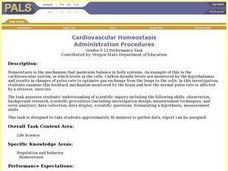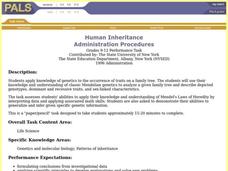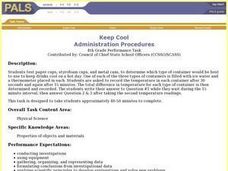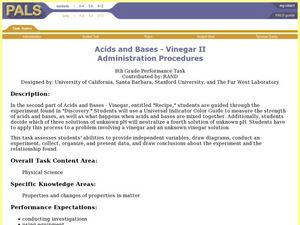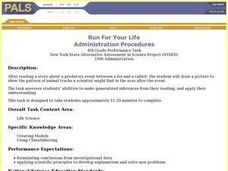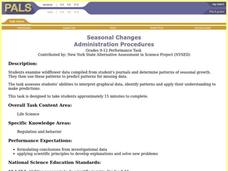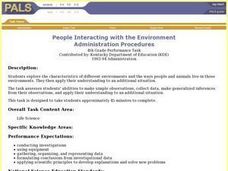Curated OER
Acid Precipitation
Young scholars test the acidity of unknown solutions. They use this information to make inferences from data given from recorded rainfall records to identify areas that receive the most acid rain.
Curated OER
Sow Bug Habitats
Students conduct an experiment to determine what type of environment sow bugs prefer. They use petri dishes with partially wet paper towels to assess whether they prefer wet or dry habitats.
Curated OER
Collecting My School Family Data
Pupils are tasked with collecting data on their school. In groups, they collect data on various aspects of school life along with social and economic backgrounds and charactertics of their hair and eye color. They draw two pictures,...
Curated OER
Cardiovascular Homeostasis
High schoolers develop and conduct an experiment to answer the question," How does cardiovascular exercise affect the pulse rate?". They record the changes to heart rate during different levels of exercise.
Curated OER
Human Inheritance
Students analyze genetic characteristics in a given family tree through the F2 generation. Students apply prior knowledge from Gregor Mendel's study with pea plants and his Laws of Heredity to answer questions.
Curated OER
Ecosystems
Students role play as members of interest group with a stake in a local land use issue. In preparation for the town hall meeting, students research their issue and gather pertinent information to persuade their audience.
Curated OER
Keep Cool
Students design an experiment to determine which type of container would be best to use to keep drinks cool on a hot day. Students test paper cups, styrofoam cups, and metal cans by filling them with ice water and they use a thermometer...
Curated OER
Acids and Bases - Vinegar II
Eighth graders experiment what happens when acids and bases are mixed together. In this acids and bases experimental lesson, 8th graders decide which of three solutions of unknown pH will neutralize a fourth solution of unknown pH.
Curated OER
Run For Your Life
Students draw a picture of animal tracks a scientist might find after they read a story about a fox chasing a rabbit. They make up a key to represent the foxes' tracks and the rabbit's tracks.
Curated OER
Fossil Guide
Young scholars produce a "Fossil Guide" that covers twelve fossils and includes a drawing and written description for each fossil. The written description should include such things as size, shape, and general appearance.
Curated OER
Seasonal Changes
Students examine wildflower data compiled from their student journals from the school year. They determine patterns of seasonal growth then use these patterns to predict patterns for missing data.
Curated OER
Acid and Bases - Alien II
Eighth graders determine which of two solutions is more acidic by adding each to a given base. Students have to apply this analysis process to a problem scenario involving an alien creature.
Curated OER
Classification of Materials
Students classify photographs into a two-way classification system. They practice with pictures of people who are young and old, male and female, then they use pictures of animals to create their own two-way classification system.
Curated OER
Circuit Boards
Pupils explore circuit boards. They determine that a complete circuit is needed to light the bulbs, experiment with the boards to develop strategies for finding where the hidden connections are, and develop strategies that can be used to...
Curated OER
Mystery Card 3
Students will make a circuit on a mystery card. They will connect wires, bulbs, and battery to form an electrical tester. After students learn how to make one following the directions, they can create their own mystery card by...
Curated OER
Animals Piece by Piece
Students sort organisms and objects into groups according to their parts and describe how the groups are formed.They identify body parts of animals from puzzle pieces, assemble the puzzle, and name the animal.
Curated OER
People Interacting with the Environment
Students explore an arctic, temperate, and tropical environment and then decide what people need in each environment to help them live comfortably and what their lives would be like.
Curated OER
Do You See What I See?
Pupils hypothesize the role of rocks, soil, and water by observing a terrarium and create a model to explore the water cycle. This is part of a five station set up.
Curated OER
Scientific Investigation- Magnets
Students conduct a scientific investigation to determine if a magnet attracts paper clips through different materials. Students write out their procedures, collect data and present it in a table or chart, and analyze their results.
Curated OER
Using the Microscope
High schoolers demonstrate their ability to properly make observations using a compound microscope. They prepare an onion skin slide and focus on it in both low and high power. Then they measure the diameter of one of the cells.
Curated OER
Fishkill
Students analyze data to determine the effect of thermal pollution on a certain species of fish. They graph temperature and dissolved oxygen and make inferences on the impact a change in temperature could have on the fish. As a class...
Curated OER
Classifying Rocks
Students classify rocks into groups after they observe the rocks and identify properties that can be used to divide them into groups. They then identify other properties that could be used to classify other objects into groups.
Curated OER
Hey, Look Me Over!
Students make observations about mealworms using hand lenses, rulers, and cotton swabs. Students complete their own mealworm observation chart, then they share their observations with the class. This is one station out of five in an...
Curated OER
The Food We Eat
Students plan a menu for one day after they study the food pyramid and learn about their daily food requirements. They are given an updated food pyramid with a summary fo dietary recommendations that replaces the old standard "four food...





